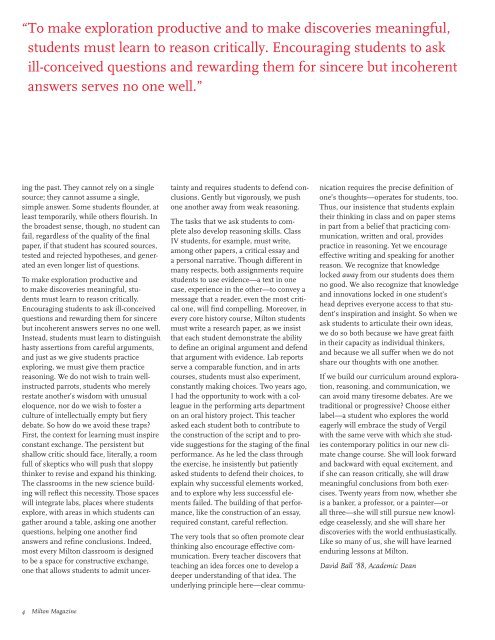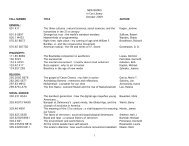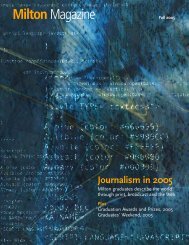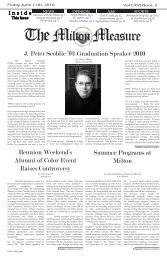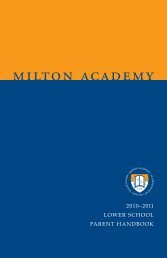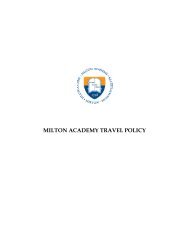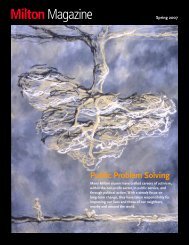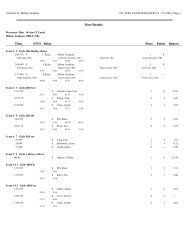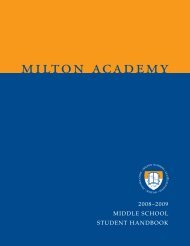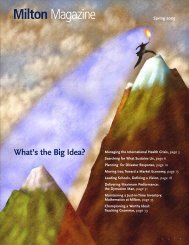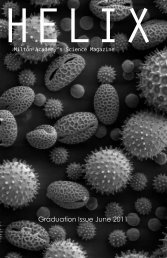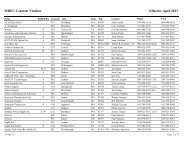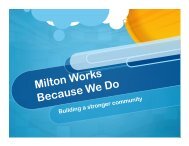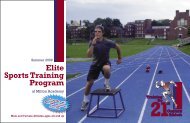Milton Magazine - Milton Academy
Milton Magazine - Milton Academy
Milton Magazine - Milton Academy
- No tags were found...
Create successful ePaper yourself
Turn your PDF publications into a flip-book with our unique Google optimized e-Paper software.
“ To make exploration productive and to make discoveries meaningful,students must learn to reason critically. Encouraging students to askill-conceived questions and rewarding them for sincere but incoherentanswers serves no one well.”ing the past. They cannot rely on a singlesource; they cannot assume a single,simple answer. Some students flounder, atleast temporarily, while others flourish. Inthe broadest sense, though, no student canfail, regardless of the quality of the finalpaper, if that student has scoured sources,tested and rejected hypotheses, and generatedan even longer list of questions.To make exploration productive andto make discoveries meaningful, studentsmust learn to reason critically.Encouraging students to ask ill-conceivedquestions and rewarding them for sincerebut incoherent answers serves no one well.Instead, students must learn to distinguishhasty assertions from careful arguments,and just as we give students practiceexploring, we must give them practicereasoning. We do not wish to train wellinstructedparrots, students who merelyrestate another’s wisdom with unusualeloquence, nor do we wish to foster aculture of intellectually empty but fierydebate. So how do we avoid these traps?First, the context for learning must inspireconstant exchange. The persistent butshallow critic should face, literally, a roomfull of skeptics who will push that sloppythinker to revise and expand his thinking.The classrooms in the new science buildingwill reflect this necessity. Those spaceswill integrate labs, places where studentsexplore, with areas in which students cangather around a table, asking one anotherquestions, helping one another findanswers and refine conclusions. Indeed,most every <strong>Milton</strong> classroom is designedto be a space for constructive exchange,one that allows students to admit uncertaintyand requires students to defend conclusions.Gently but vigorously, we pushone another away from weak reasoning.The tasks that we ask students to completealso develop reasoning skills. ClassIV students, for example, must write,among other papers, a critical essay anda personal narrative. Though different inmany respects, both assignments requirestudents to use evidence—a text in onecase, experience in the other—to convey amessage that a reader, even the most criticalone, will find compelling. Moreover, inevery core history course, <strong>Milton</strong> studentsmust write a research paper, as we insistthat each student demonstrate the abilityto define an original argument and defendthat argument with evidence. Lab reportsserve a comparable function, and in artscourses, students must also experiment,constantly making choices. Two years ago,I had the opportunity to work with a colleaguein the performing arts departmenton an oral history project. This teacherasked each student both to contribute tothe construction of the script and to providesuggestions for the staging of the finalperformance. As he led the class throughthe exercise, he insistently but patientlyasked students to defend their choices, toexplain why successful elements worked,and to explore why less successful elementsfailed. The building of that performance,like the construction of an essay,required constant, careful reflection.The very tools that so often promote clearthinking also encourage effective communication.Every teacher discovers thatteaching an idea forces one to develop adeeper understanding of that idea. Theunderlying principle here—clear communicationrequires the precise definition ofone’s thoughts—operates for students, too.Thus, our insistence that students explaintheir thinking in class and on paper stemsin part from a belief that practicing communication,written and oral, providespractice in reasoning. Yet we encourageeffective writing and speaking for anotherreason. We recognize that knowledgelocked away from our students does themno good. We also recognize that knowledgeand innovations locked in one student’shead deprives everyone access to that student’sinspiration and insight. So when weask students to articulate their own ideas,we do so both because we have great faithin their capacity as individual thinkers,and because we all suffer when we do notshare our thoughts with one another.If we build our curriculum around exploration,reasoning, and communication, wecan avoid many tiresome debates. Are wetraditional or progressive? Choose eitherlabel—a student who explores the worldeagerly will embrace the study of Vergilwith the same verve with which she studiescontemporary politics in our new climatechange course. She will look forwardand backward with equal excitement, andif she can reason critically, she will drawmeaningful conclusions from both exercises.Twenty years from now, whether sheis a banker, a professor, or a painter—orall three—she will still pursue new knowledgeceaselessly, and she will share herdiscoveries with the world enthusiastically.Like so many of us, she will have learnedenduring lessons at <strong>Milton</strong>.David Ball ’88, Academic Dean4 <strong>Milton</strong> <strong>Magazine</strong>


